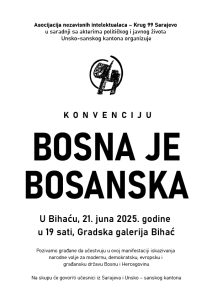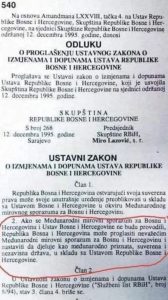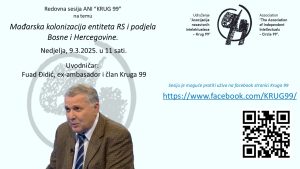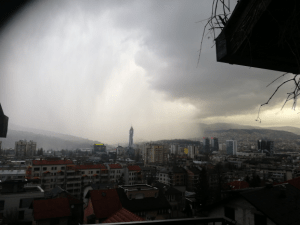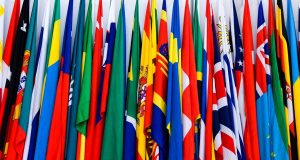THE EUROPEAN PARADIGM AND THE REEMERGENCE OF NAZI-FASCISM

| Announcement from Sarajevo |
| 11. May 2022. – 4 |
| THE EUROPEAN PARADIGM AND THE REEMERGENCE OF NAZI-FASCISM Today there is a fateful intertwining of past and present, of the citizens of Bosnia and Herzegovina during the 1990s and the citizens of Ukraine in the 2020s in their resistance to aggression and radical ethno-nationalism emanating from neighboring states. But in the balance is also the future of Europe, as well as the alternatives that confront the continent. The re-emergence of old Nazi-fascist ideologies (as a combined phenomenon of Nazism and fascism) and its appearance on the European continent is the greatest challenge and danger to peace and stability. Will Europe resemble the map in the non-paper of the recent Prime Minister of Slovenia Janez Jansa and other authoritarian Balkan leaders? This was forged on the model of Putin’s objective to alter the architecture of the Balkans and of Europe through forceful changes of existing borders out of “concern” for the position of ethnic groups in other countries. Or, will Europe, including Bosnia and Ukraine, consist of pluralistic communities of citizens where everyone can freely develop his individual political identity, both culturally and collectively? World War Two was a tragic continuation of World War One, which was the great national-fascist war. But the seeds of nationalism endured beyond this and spawned a new Nazi-fascism. Even the democratic revolutions of 1989 and afterwards were at one and the same time both national and ethno-centric. The war in former Yugoslavia converted the former Yugoslav republics into more ethnically cleansed, more compact and much less complex areas than ever before in their history. The Moscow regime’s aggressive rhetoric about nations and states that do not deserve to exist is the stance expressed by Russian Minister of Foreign Affairs Sergey Lavrov, who believes that sovereign states should only be those which represent a single ethnic nation. That is a statement that every inveterate nationalist in Bosnia and Herzegovina, and those especially in neighboring states, could easily ascribe to. This declaration clearly highlights the new-old dimension of Nazi-fascism that has emerged into the light of day in our time. The line of divergence is between, on the one hand, ethno-nationalism and a series of political doctrines dealing with identity and struggles for “living space” versus, on the other hand, weak pluralist inclusive liberal democracy. The objectives of the Putin regime are radically nationalist, as were the wartime objectives of neighboring states that conducted aggression against Bosnia in 1992. The more radical and militant that nationalism is, the more it takes on elements of old Nazi-fascism, not necessarily of the Hitler-Mussolini type, but rather adapted to momentary political circumstances. Today this is every radical ethno-centric view of the world with its cults and rituals of victimhood, heroism, purity of identity and obsession with territorial delineations. We are faced with the re-emergence of the old policies of Nazi-fascism: the rights of the so-called mother states to expand territorially at the expense of other states, their aspirations for the territory of other states because of ethic identity and protection of part of the population, issuing citizenship of outside sovereign states to a part of the population of the same ethnic orientation, etc. The operational fuel for today’s Nazi-fascism is the radical populist anger which in recent decades we have seen spreading throughout Europe and the U.S. And there is ample evidence that the Putin regime has provided abundant financial assistance to these worldwide identity movements and policies. Umberto Ecco identified certain indicators as: the cult of tradition, irrationalism, anti-criticism, anti-intellectualism, individual and collective frustration, conspiracy, humiliation, vitalism, elitism, heroism, machismo, selective and qualitative populism and new ways of speaking. It is only necessary for one of these elements to be present for fascism to coalesce around them all. Many of these characteristics can be readily identified today in Bosnia and Herzegovina and in its immediate neighborhood. The ethno-centric oligarchies of today rule in an authoritarian way within their own ethnically cleansed areas. In this they are aided by ideologies into which are interwoven the attitudes, symbols and phraseology of national-fascist projects from World War Two. There are eloquent examples in Bosnia and Herzegovina over the past 30 years. For them the universal humanistic values are a strange substance which can be displaced following historic revisionist projects that reinterpret activities from during World War Two. Notorious genocidal national-fascists have arisen from the past through the re-emerged political legacy of separation and discrimination. The process of transition to liberal democracy and a free market economy has not yet been completed in the countries of former socialist and communist regimes in Eastern Europe. This presents an opportunity for the strengthening of populist movements based on the ideas of Nazism and fascism of former times. Reference to quisling ideologies and groupings from World War Two have become the ubiquitous ideological décor of all Balkan figures obsessed with a new identity. For a fact, for decades now Europe has made concessions to the ethno-nationalists in power in the Western Balkans, including in Bosnia and Herzegovina. Neo-Nazi-fascism will not be defeated in this part of the world without the systematic building of liberal democracy, which can supersede the catastrophic consequences of ethno-centrism. “Circle 99” is appealing for international solidarity and support in the struggle for the democratic reconstruction of a modern European Bosnia and Herzegovina, including a transition from the tripartite ethnic to a civic oriented state in which the fundamental value will be equality of all its citizens. The presenter at this session was Dr. Asim Mujkic, Professor of Political Science at the University of Sarajevo Summary of Session of 9 May 2022 Adil Kulenović, President |
| Association of Independent Intellectuals – Circle 99 (Bosnian: Krug 99), a leading Bosnian think-tank, was established in Sarajevo in 1993, in the midst of the Bosnian war (1992-1995), while the capital was under siege. Circle 99 provides a platform to bring together intellectuals of various professional and ethnic identities; university professors, members of the Academy of Sciences and Arts of Bosnia and Herzegovina, artists, journalists, entrepreneurs, diplomats, and other prominent figures from Bosnia and from abroad. Multidisciplinary discussions and initiatives are held each Sunday throughout the academic year, in the form of regular sessions about politics, science, education, culture, economy, and other societal issues. The overall goal is to sensitize the public towards a democratic transformation, achieving and maintaining peace, and integration of modern Bosnia into the community of countries fostering liberal democracy. Circle 99 has been declared an organization of special significance for the city of Sarajevo. |

